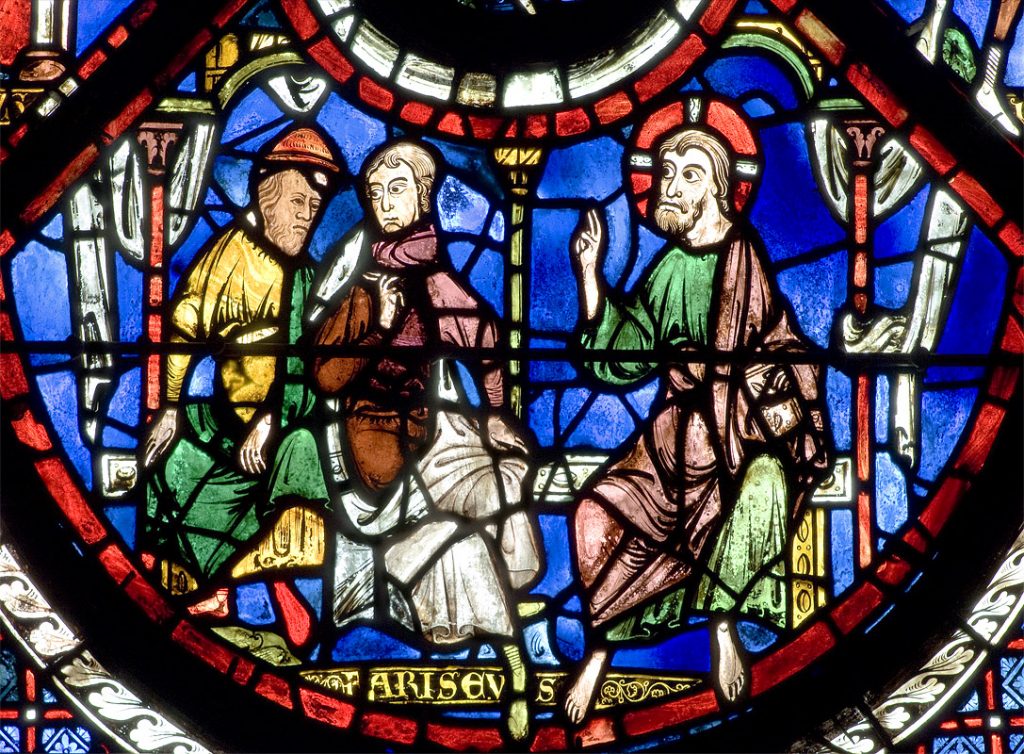
Throughout the month of August, we’re taking a close look at 23 verses of the New Testament. They comprise Ephesians chapter one, which paints one of the Bible’s most comprehensive pictures of what it means for ordinary people to be “in Christ.”
I grew up in a church populated by stained-glass saints.
Our sanctuary windows featured dozens of them — monumental, brightly colored portraits of men and women whose lives appeared to be serenely right with God. Their faces were placid and trusting. Their heads were enveloped by golden auras or haloes. All of them were heroes of the faith.
I don’t ever remember thinking that I could be one of them. I don’t remember a moment in which I even wanted to be like them. How could an ordinary person be a stained-glass saint?
Such thoughts seemed to swirl around my efforts at prayer. I wondered how God could put up with my meandering attempts at trying to generate a conversation with him. I didn’t know what to do with my body. Was I supposed to look somewhere? Should I close my eyes? Was I supposed to stand or sit or kneel or walk? Did I need to learn an entirely new vocabulary?
Three pastors once got together in a church study to discuss prayer techniques. In an adjoining room there happened to be a telephone repairman who was working on the lines. The first pastor said, “When I pray, I find it helps to hold my hands together like this, as a personal expression of worship.” The second suggested that real prayer ought to be conducted on one’s knees. The third pastor jumped in, “I think the most authentic posture for talking to God is to lie stretched out on one’s face.”
At that moment the telephone repairman, who’d been eavesdropping, poked his head around the corner and said, “I’d have to say the most heartfelt prayer I ever prayed was when I was dangling upside-down by my heels from a utility pole about forty feet above the ground.”
What I didn’t know all those years when I was staring at the stained-glass saints is that most of them talked to God more like the telephone guy than those pastors. It had never occurred to me that in the Bible the Big Names regularly found themselves in the midst of Big Crises.
That brings us to Paul’s signature expression of devotion to the Ephesians in verse 16: “I have not stopped giving thanks for you, remembering you in my prayers.”
This is reminiscent of some other statements he makes in his other letters. “Rejoice always, pray continually, give thanks in all circumstances” (I Thessalonians 5:16-18). “Rejoice in the Lord always. I will say it again: Rejoice!” (Philippians 4:4)
Paul is modeling prayer and thanksgiving as a sustained, moment-by-moment way of life.
He appears to anticipate our sighs of skepticism. “’Rejoice in the Lord always?’ Well, you’re not in my situation. You have no clue how hard my life is.” Which is perhaps why he goes on, “Just so there’s no misunderstanding, let me say it again: Rejoice!” Paul, after all, was intimately acquainted with difficult situations. Scholars believe he penned his letters to the Ephesians and Philippians from the inside of jail cells, and wrote to the Thessalonians while on the run from enemies.
The most challenging aspect, of course, is summed up in the words “always” and “have not stopped giving thanks.”
Sometimes I approach stretches of frantic busyness with a grim attitude of survival. “My only concern right now, my only goal, is to get through these next few days. Then things will get better.” Prayer gets pushed to the edges of my consciousness. “I just need to slog my way through this list of things to do, and then I can breathe again.”
But there’s always another frantic stretch waiting on the other side. What I have learned is how seldom I stop to rejoice in the midst of busyness. I may picture myself rejoicing at the “finish line.” But by doing that I have cut myself off from this moment – this irretrievable, irreplaceable moment – in which I can connect with the Lord who is always with me.
Paul says, “Be alive now. Stop picturing life as grim stretches that have to be endured.” Do we really want to live the rest of our lives wishing that this moment was some other moment than this moment? God is exclusively available to us in the present tense. What makes this moment count forever is that what we experience now has the power to transform all our future moments as well.
When all is said and done, there are two essential alternatives regarding every situation we face. We can either worry or we can pray.
Prayer is a conversation – even if only a fleeting one – that I have with God. Worry is a conversation I have with myself: “What am I going to do?” Either we are in charge – which means we have a whole lot of worrying to do – or God is in charge, which immediately transforms prayer from an every-now-and-then religious activity into an ongoing series of touchpoints with the One who secures my life.
I once heard a man describe his experience as a first-time skydiver. He had received parachute training, donned a jump suit, flown aloft, and witnessed other jumpers land safely on the ground.
Poised at the open door of the aircraft, he patted his parachute and asked his flight instructor one final question: “Is this thing really going to work?”
His instructor smiled and said, “There’s only one way to find out.”
Can God be trusted…in everything? Can we really sustain a conversation with him…no matter what the circumstances?
There’s only one way to find out.
